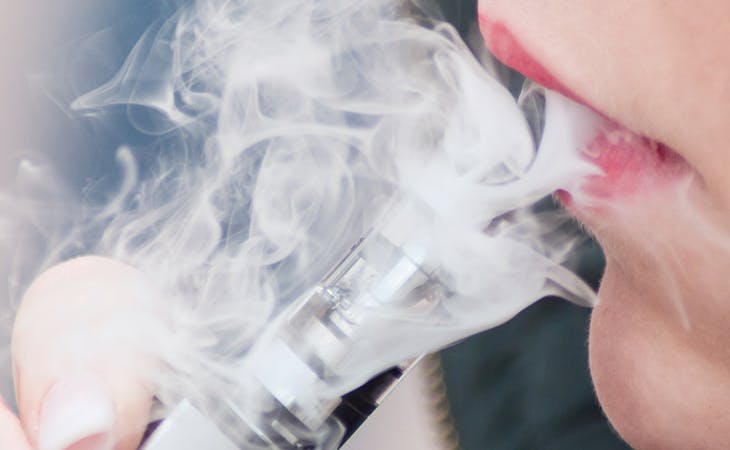Vaping has become big business—and along with it has come a growing concern for its impact on health. According to a 2017 survey by the Centers for Disease Control and Prevention, nearly seven million Americans, 18 or older, use e-cigarettes. Even though it’s illegal to sell e-cigarettes to anyone under 21, research by the U.S. Food and Drug Administration found that an estimated 3.6 million middle school and high school students reported using e-cigarettes in 2018—a whopping 78% increase in e-cigarette use by high school students alone in just one year.
While recent reports have shown the dangers associated with vaping and the steps the government is taking to limit or block flavored e-cigarettes, new research out of Oklahoma State University specifically examined the connection between e-cigarettes and sleep.
“Nicotine is known to act as a stimulant,” explains Sara E. Benjamin, MD, a board-certified doctor in neurology and sleep medicine at Johns Hopkins Center for Sleep. “As both e-cigarettes and traditional cigarettes contain nicotine as the active ingredient, the impact on sleep should be the same.”
E-cigarettes and sleep
The recent study, published in the Journal of Sleep Research, analyzed the sleep health of 1,664 college students, comparing daily e-cig users, occasional e-cig users, combustible cigarette users, and nonusers.
Poor sleep health, which the article defined as “sleep of inadequate quality, timing, efficiency, or duration to prevent daytime sleepiness” is already a public health issue in the United States, particularly with college students, 60% of whom self-report as having “poor quality” sleep. As vaping use continues to rise across the U.S., this study revealed important impacts that regular and even occasional vaping can have on sleep.
Key findings
- Never-users had fewer sleep disturbances, decreased daytime sleepiness, lower rates of sleep medication use, and better overall sleep quality than either e-cigarette or combustible cigarette users.
- Both combustible and e-cigarette users reported significantly more sleep difficulties than never-users.
- E-cigarette users reported greater use of sleep medication than combustible cigarette users.
- Even non-daily e-cigarette users (those who vaped only weekly or monthly) reported lower overall sleep quality and higher use of sleep medication than never-users, suggesting that even occasional vaping can negatively impact sleep.
How nicotine impacts your sleep
Research has shown that nicotine use negatively impacts getting quality Z’s.
“Smokers tend to take a longer time to fall asleep, have less total sleep, and to have more light sleep than nonsmokers,” says Benjamin. Current smokers report significantly less total sleep time, with increased difficulty both falling asleep and staying asleep, compared with nonsmokers.
Here’s how nicotine keeps you from getting a good night’s sleep.
It stimulates body systems
While smokers may use e-cigs and combustible cigarettes to calm down or relax, nicotine is actually a stimulant. Research has found that nicotine use increases pulse rate and blood pressure and causes increased activity in the brain’s prefrontal cortex and visual systems, making it harder to get to sleep.
It disrupts REM sleep
Previous studies have found that nicotine use suppresses REM (rapid eye movement) sleep, a key phase of the sleep cycle that makes up about 25% of your sleep every night. According to the National Institutes of Health, REM sleep is believed to be important for the process of learning, storing memories, and regulating mood. In fact, research has shown that when people are not allowed to get REM sleep, they are unable to remember things they were taught before going to bed. Limited or disrupted sleep is also linked to a host of health conditions such as increased stress, mood disorders, headaches, and cognition and memory problems. Long-term impacts include high blood pressure, cardiovascular disease, weight issues, and an increased risk of certain cancers.
It causes nighttime withdrawals
Studies have shown that nicotine withdrawal symptoms can start as soon as four hours after a final cigarette. This means that for regular vapers, sleep can be disrupted by middle-of-the-night nicotine withdrawal symptoms such as insomnia, headaches, restlessness, anxiety, and sweating.
How to stop vaping and sleep better
If you’re trying to use e-cigarettes in an attempt to stop smoking traditional cigarettes, you will still see negative impacts on your nightly sleep. “As a physician, I cannot condone the use of any type of cigarette,” says Benjamin. “But if a person is using an e-cigarette to cut back on nicotine in an effort to stop smoking, I would recommend having the last puff as early in the day as possible.”
Your best option for a good night’s sleep is to cut out vaping altogether with these tips from SmokeFree.gov and TruthInitative.org:
- Learn your triggers
- Prepare for cravings and withdrawal
- Exercise
- Remove temptations
- Find new stress-relief tools
- Get support. Call 1-800-QUIT-NOW
Booze also has a major impact on your ability to get quality sleep. Here, learn how alcohol messes with your sleep—and what to do about it.




